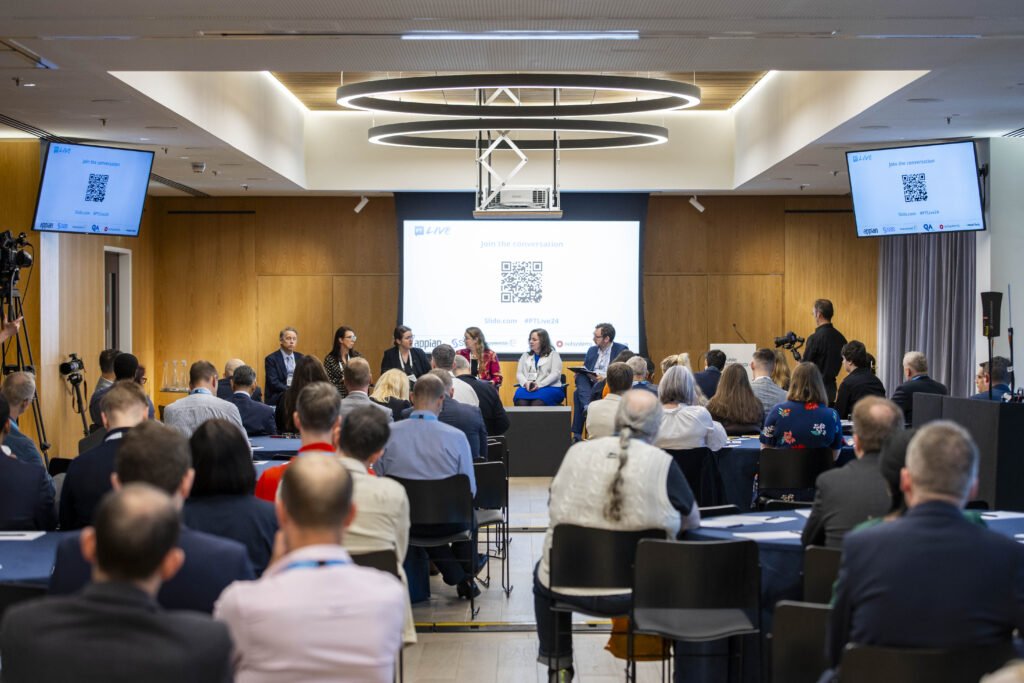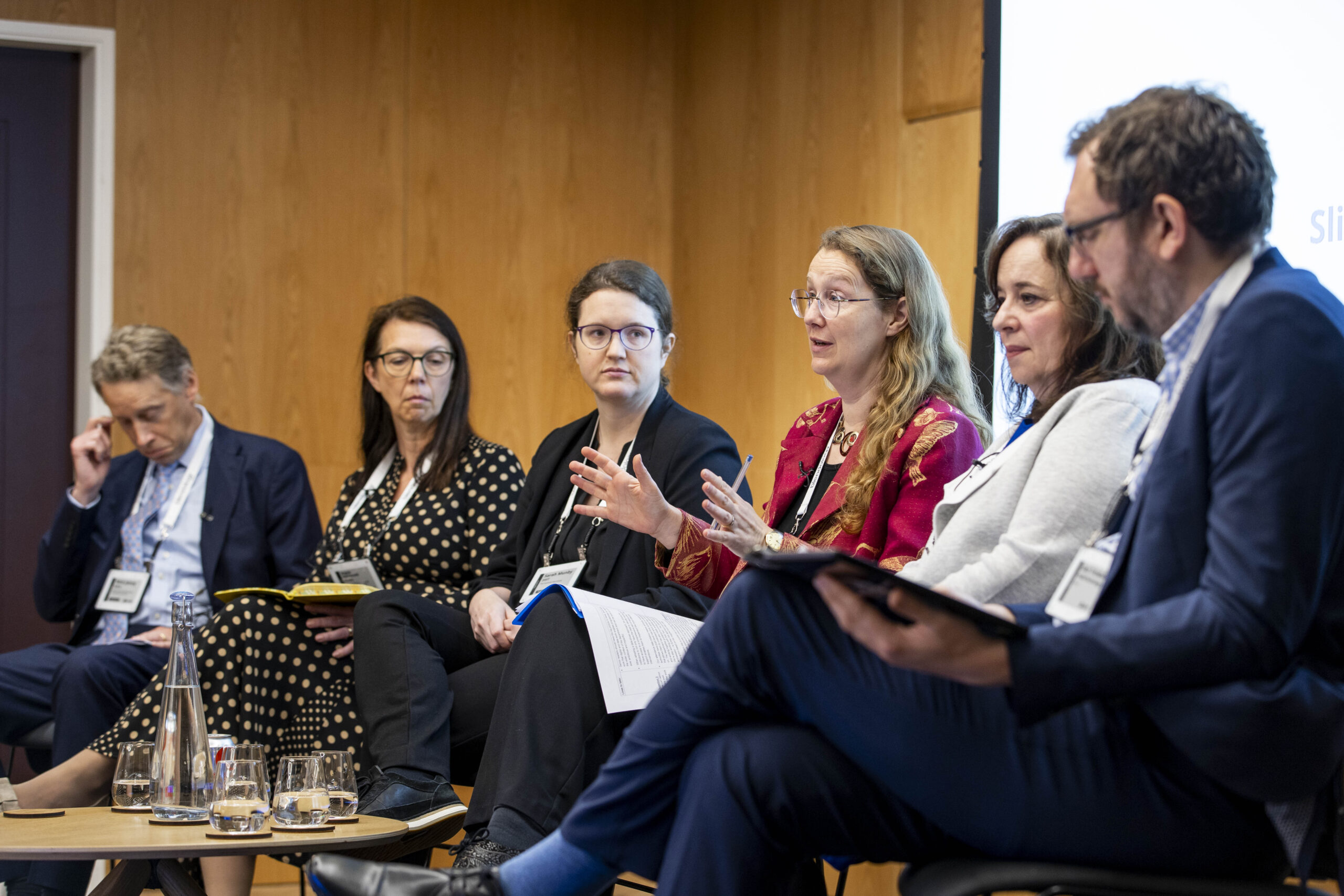At the PublicTechnology Live conference on Tuesday, permanent secretaries representing HMRC, Defra, DSIT, DVLA and DfE told attendees of how and why tech knowledge has become crucial for senior leaders
The leaders of some of government’s biggest departments have highlighted the critical importance of senior managers developing sufficient digital expertise to enable them to “lead from the front”.
Permanent secretaries representing five departments and agencies – including HMRC, Defra, DVLA, the Department for Education, and the Department for Science, Innovation and Technology – discussed the role of leaders in supporting the use of digital and data across government in a panel discussion (picture above) at the PublicTechnology Live conference in London on Tuesday.
Angela MacDonald, second permanent secretary at HM Revenue and Customs, said that digital and data “used to be a thing that kind of happened at the back” but is now something all civil servants need to be tuned into.
“No matter your profession these days, unless you also are able to be coherent and be able to discuss and have enough knowledge around digital and data, I don’t think you can do any topic – whether that’s policy or operational delivery or finance,” she said.
Explaining how she has embraced this approach, MacDonald said: “I’m directly accountable for our digital and data. I understand the technology architectures. I’ve worked really hard to educate myself because I think this is a topic which, increasingly, we’ve got to lead from the front.”
She said compared this to a yesteryear when “your data protection officer was some person you’ve probably never heard of, your digital and data architecture was not something which the senior team particularly paid attention to”.
But she warned: “If the most senior people are not driving it forward, then it will recede back into just being the really clever people who kind of sit in a room somewhere at the back.”
“Even though people are legally obliged to transact with us, we have the mindset that they could vote with their feet and go elsewhere – and that brings a different perspective, when you’re developing digital services for the consumer.”
Julie Lennard, DVLA
Department for Education permanent secretary Susan Acland-Hood – who told attendees she had experiencing of computer programming using the BBC BASIC language – said it is also necessary to understand “what you don’t know – and that you aren’t ever going to be the most expert person in the room”.
She added: “I think this is an area where a little knowledge is a dangerous thing and, if I overrated my BBC BASIC coding experiences as a foundation for understanding the detail of what my technology teams were doing, I probably wouldn’t lead them very well.”
Instead of trying to be the expert, “you need to know how to ask good questions and build great teams,” she said.
The DfE perm sec said it is also very important for senior leaders to set clear priorities, as “there are always more things that people across the department want digital data colleagues to do than they could possibly do even if there were eight times as many of them and they worked eight times as hard”.
She also championed the value of taking a “really good, positive approach to the management of risk”, by giving people permission “to test and try things that might not work” within a clear framework that “gives people the safety and comfort to do that” while setting appropriate boundaries.
The Department for Science, Innovation and Technology has a remit to promote the UK’s tech sector, as well as the country’s standing on the world stage as a technology leader. According to the department’s permanent secretary Sarah Munby, a digitally skilled and equipped public sector is a key part of the wider tech economy.
Asked if government’s effective use of digital was simply an enabler for other outcomes – or had its own intrinsic value – she responded that “it is an end, in and of itself, for us”.
Munby said: “Because, ultimately, if we don’t equip the public sector as a customer of fantastic technology, as an investor in fantastic technology, as a builder of skills in fantastic technology – we are always delighted to bring skills in from the outside, but we are also a big engine of skill-development ourselves – if we don’t get that right, the chances of having a thriving sector her in the UK are very much diminished.”
She added: “We spend a huge amount of time with the technology sector, thinking about what can government do to help this utterly critical part of our nation thrive. And there are a series of reasons [why this is important]. It is a huge economic opportunity for the UK – we are only the third country in the world to build a trillion-dollar technology sector. It is also vital for delivering for the public – delivering better life experiences, not just via the public sector, but right across the economy. And it is also a critical part of our future security as a nation.”
‘A different perspective’
With about 50 million people making use of its services, the Driver and Vehicle Licensing Agency surely one of the parts of government that is most familiar to citizens.
As a growing number these are bringing with them expectations shaped by the consumer world, chief executive Julie Lennard explained that the DVLA’s delivery of services is informed by considering people as customers, rather than just service users.
“Even though people are legally obliged to transact with us, we have the mindset that people could vote with their feet and go elsewhere – and that brings a different perspective, when you’re developing digital services for the consumer. You are very much looking at it from [their] point of view, rather than as a government department looking at it and saying: what makes it easier for us? That is not the way that we can approach our services – because they are customer-facing.”
The creation of the agency’s services is supported by “a state-of-the art UX (user experience) lab which we use extensively”, according to Lennard – who echoed Acland-Hood’s point in speaking of the importance of “not making that assumption that, as senior leaders, you have the answers”.
She added: “There are many times with services when something comes through to our boards – and we might have an opinion on it. But it will always come down to: what’s the evidence from user testing? That is what will drive it.”

Nick Joicey, second permanent secretary at the Department for Environment, Food and Rural Affairs, told attendees about the way in which some common digital principles and practices – including user research, as well as teams comprised of differing disciplines – have informed the department’s delivery of some major schemes. This includes the Future Farming and Countryside Programme, which has overseen the implementation of the country’s post-Brexit agricultural regime.
“The way in which we have led that really has been by bringing together – in a way that I don’t think we had done previously – policy, operational and digital teams,” Joicey said. “If you talk to anyone who has been involved in that programme, they would say upfront that has been challenging – to drive those changes in ways of working. One of the things I’m really proud of is the way in which we have changed how we have engaged with farmers and other users in the process of developing and rolling out that change. Some of the things that flow from that are the importance of the clarity of the outcome.”
He added: “We have also been really bringing to the fore service ownership – that you have a clear owner for the service, who looks at it end to end, and what is the experience there. And also championing multidisciplinary teams and ways of working, really encouraging people to come together in that new way and do that right at the start. As a leader in Defra, I really see my role as championing that, helping break down some of those barriers, and really enabling those different ways of working.”

Look out in the coming days for lots more insights and coverage of PublicTechnology Live






I’ve observed that in the world nowadays, video games will be the latest trend with children of all ages. There are occassions when it may be not possible to drag your son or daughter away from the games. If you want the best of both worlds, there are many educational video games for kids. Great post.
Hello, Neat post. There’s an issue along with your website in web explorer, may test this?IE still is the market chief and a good section of other folks will miss your wonderful writing due to this problem.
Another thing I’ve noticed is the fact for many people, low credit score is the reaction of circumstances above their control. One example is they may be actually saddled through an illness and because of this they have excessive bills for collections. It may be due to a work loss or inability to work. Sometimes divorce proceedings can really send the financial circumstances in the undesired direction. Many thanks sharing your ideas on this web site.
Today, I went to the beachfront with my children. I found a sea shell and gave it to my 4 year old daughter and said “You can hear the ocean if you put this to your ear.” She placed the shell to her ear and screamed. There was a hermit crab inside and it pinched her ear. She never wants to go back! LoL I know this is completely off topic but I had to tell someone!
Hello.This article was extremely motivating, especially because I was looking for thoughts on this topic last Sunday.
https://infohelpforyou.com/tag/ebb680ec82b0ebb2bceba3a9ec8b9cec9ea5-eab5acec9db8eab5aceca781/
Thanks for your write-up. I also think laptop computers are getting to be more and more popular today, and now will often be the only type of computer found in a household. Simply because at the same time potentially they are becoming more and more affordable, their processing power is growing to the point where they may be as powerful as desktop coming from just a few in years past.
https://klero.tistory.com/tag/2021년20서울시20무급휴직20고용유지20지원금
https://new-software.download/windows/google-classroom/
양산시술출장마사지
https://new-software.download/windows/bandicam/
https://kakaotaxi.dasgno.com/kakao-taxi2
https://bestkkultip.tistory.com/28